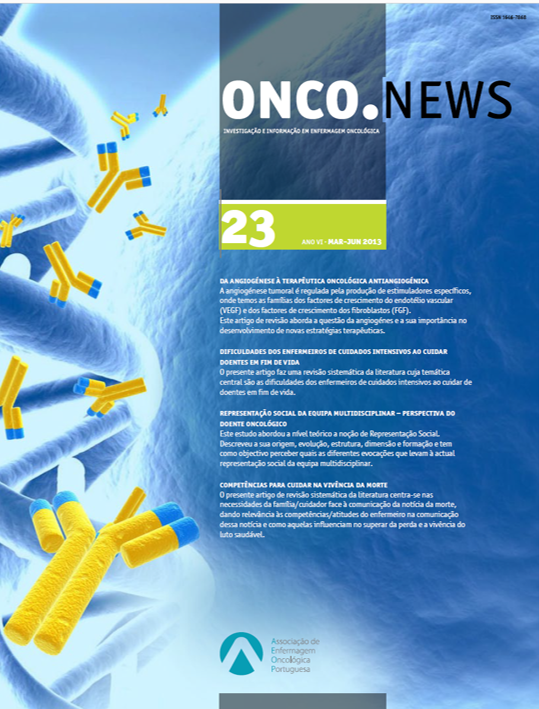From angiogenesis to antiangiogenic cancer therapy
DOI:
https://doi.org/10.31877/on.2013.23.01Abstract
Major advances in molecular biology lead to a better understand of the mechanisms of carcinogenis. The angiogenesis is a process by which tumor cells stimulate the formation of new blood vessels needed for the supply of essential nutrients for rapid growth of tumors. The tumor angiogenesis is regulated by the production of angiogenesis stimulators, including members of vascular endothelial growth factor (VEGF) and fibroblast growth factor (FGF) families.
The tumors may activate angiogenic inhibitors such as angiostatin and endostatin that can modulate angiogenesis both at the primary site of tumor as in downstream sites of metastasis. The use of angiogenic inhibitors as anticancer drugs is currently under intense investigation. Such agents may have a reduced toxicity and be less likely to generate resistance than cytotoxic drugs. The ongoing clinical trials aim to develop optimal treatment strategies with antiangiogenic agents.
Downloads
References
Brown JM, Giaccia AJ. Enzyme eliminated by cancer cells holds promise for cancer treatment. April 1, 1998. The unique physiology of solid tumors: opportunities (and problems) for cancer therapy. Cancer Research 58: 1408–16. PMID 9537241
Bergers G, Benjamin LE (June 2003). “Tumorigenesis and the angiogenic switch”. Nature Reviews. Cancer 3 (6): 401–10. doi:10.1038/nrc1093. PMID 12778130
Rafii S, Heissig B, Hattori K (May 2002). Efficient mobilization and recruitment of marrow-derived endothelial and hematopoietic stem cells by adenoviral vectors expressing angiogenic factors. Gene Therapy 9 (10): 631–41. doi:10.1038/sj.gt.3301723. PMID 12032709
Ozer E, Ozkal S, Karademir S, et al: Angiogenesis and p53 and H-ras mutations in pancreatic ductal adenocarcinoma. Analytical & Quantitative Cytology & Histology 1999; 21(6):473-476
Maclean Ab, Reid Wm, Rolfe KJ, et al: Role of angiogenesis in benign, premalignant and malignant vulvar lesions. Journal of Reproductive Medicine. 2000; 45(8):609-612.
Gordon MS, Cunningham D. Managing patients treated with bevacizumab combination therapy. Oncology. 2005; 69 Supply 3:25-33.
Folkman J, Klagsbrun M (January 1987). Angiogenic factors. Science (New York, N.Y.), 235 (4787):442-7. htt://www.sciencemag.org. 2009 – 06 - 18.
Sezer O, Jakob C, Eucker J, Niemoller K, Gatz F, Wernecke K, Possinger K. Serum levels of the angiogenic cytokines basic fibroblast growth factor (bFGF), vascular endothelial growth factor (VEGF) and hepatocyte growth factor (HGF) in multiple myeloma. J Haematol 2001; 66: 83-88.
Akbulut H, Altuntas F, Akbulut KG, Ozturk G, Cindoruk M, Unal E, Icli F. Prognostic role of serum vascular endothelial growth factor, basic fibroblast growth factor and nitric oxide in patients with colorectal carcinoma. 2002 Nov 24; 20(4):184-90.
Broll R, Erdmann H, Duchrow M, Oevermann E, Schwandner O, Markert U, Bruch HP, Windhovel U. Vascular endothelial growth factor (VEGF)—a valuable serum tumors marker in patients with colorectal cancer? Eur J Surg Oncol. 2001 Feb; 27(1):37-42.
Xiong B, Sun TJ, Hu WD, Cheng FL, Mao M, Zhou YF. “Expression of cyclooxygenase-2 in colorectal cancer and its clinical significance”. World J Gastroenterology. 2005 Feb 28; 11(8):1105-8.
Wu AW, Gu J, Li ZF, Ji JF, Xu GW. “COX - 2 expression and tumor angiogenesis in colorectal cancer”. World J Gastroenterology. 2004 Aug 15; 10(16):2323-6.
Peeters CF, de Geus LF, Westphal JR, de Waal RM, Ruiter DJ, Wobbes T, Oyen WJ, Ruers TJ. Decrease in circulating anti-angiogenic factors (angiostatin and endostatin) after surgical removal of primary colorectal carcinoma coincides with increased metabolic activity of liver
metastases. Surgery. 2005 Feb; 137 (2):246-9.
Velde EA, Vogten JM, Gebbink MF, van Gorp JM, Voest EE, Borel Rinkes IH. Enhanced antitumor efficacy by combining conventional chemotherapy with angiostatin or endostatin in a liver metastasis model. Br J Surg. 2002 Oct; 89(10):1302-9.
Zondor SD, Medina PJ. Bevacizumab: an angiogenesis inhibitor with efficacy in colorectal and other malignancies. Ann Pharmacotherapy. 2004 Jul-Aug;38(7-8):1258-64.
Sledge GW Jr, Miller KD. Angiogenesis and antiangiogenic Therapy. Curr Probl Cancer 2002; 26:1-60.
Jain RK. Molecular Regulation of Vessel maturation. Nat Med 2003; 9:685-93
Carmeliet P. VEGF as a key mediator of angiogenesis in Cancer. Oncology 2005: 69 (suppl.3): 4-10
Ferrara N, Gerber HP, LeCouter J. The biology of VEGF and its receptors. Nat Med. 2003;9: 669–676. doi: 10.1038/nm0603-669. A concise review of the role of VEGF-A and its receptors in biology and disease.
Ferrara N, Hillan KJ, Gerber HP, Novotny W. Discovery and development of bevacizumab, an anti-VEGF antibody for treating cancer. Nat Rev Drug Discov. 2004; 3: 391 – 400. doi: 10.1038/nrd1381. Inhibition of VEGF-A with humanized anti-VEGF-A antibody is effective in treating
human cancer.
Senger DR, Galli SJ, Dvorak AM, Perruzzi CA, Harvey VS, Dvorak HF. Tumor cells secrete a vascular permeability factor that promotes accumulation of ascites fluid. Science. 1983; 219: 983 – 985. The initial discovery of a secreted VPF with the characteristics of VEGF-A.
Stacker SA, Caesar C, Baldwin ME, Thornton GE, Williams RA, Prevo R, Jackson DG, Nishikawa S, Kubo H, Achen MG. VEGF-D promotes the metastatic spread of tumor cells via the lymphatics. Nat Med. 2001;7: 186–191. doi: 10.1038/84635. VEGF-D-stimulated lymphangiogenesis mediates tumor metastasis.
Savory LJ, Stacker SA, Fleming SB, Niven BE, Mercer AA. Viral vascular endothelial growth factor plays a critical role in orf virus infection. J Virol. 2000; 74: 10699–10706. doi: 10.1128/JVI.74.22.10699-10706.2000. Disruption of the VEGF-E gene results in reduced vascularization
of lesions produced by Orf virus infection.
Pinho MSL. Angiogenese: O Gatilho Proliferativo. Ver. Brás. Coloproct. 2005; 25(4): 396-402.
Diaz-Rubio E, Schmoll HJ. The future development of bevacizumab in colorectal cancer. Oncology. 2005; 69 Supply 3:34-45.
Gordon MS, Cunningham D. Managing Patients Treated with bavacizumab in colorectal cancer. Oncology. 2005; 69 Supply 3:25-33.
Downloads
Published
How to Cite
Issue
Section
License
Copyright (c) 2023 M. Jorge Freitas Almeida

This work is licensed under a Creative Commons Attribution-NonCommercial-ShareAlike 4.0 International License.




